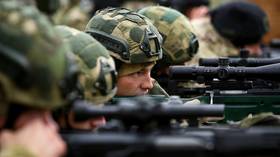The world is bracing for a potential armed showdown over Ukraine, which all sides say they don’t want to happen
Russia and its CSTO ally Belarus have announced joint military exercises in February, which Western pundits claim are part of preparations for an invasion of Ukraine. Meanwhile, Kiev has been receiving new weapons from the UK, this week, with the shipments touted as boosting its ‘self-defense’.
At the same time, EU members are debating what exactly would trigger anti-Russian sanctions that they have pledged to impose in response to an attack. Moscow continues to insist it has no intention to use force against Kiev.
Didn’t US-Russia talks defuse things?
Several rounds of diplomatic talks between Russia and the US and NATO failed, last week, to produce a breakthrough. The Western side rejected Moscow’s demand to stop the military bloc’s expansion in Europe and, in particular, to disavow its 2008 pledge to eventually admit Ukraine and Georgia.
What is Russia doing regarding Ukraine?
Moscow stands accused by the West of amassing troops and military equipment in what is seen as preparation for a full-scale invasion of Ukraine. The White House said on Tuesday a Russian attack may happen “at any moment”.
Washington and Kiev also attributed to Russia last week’s cyberattacks, which defaced several Ukrainian government websites. Victoria Nuland, best known as Washington’s ‘midwife’ for the 2014 Maidan in Ukraine, called such actions a “tried and true part of the Russian playbook.” The undersecretary of state said the US had 18 scenarios prepared on how to react to whatever Moscow does.
What is Ukraine doing?
Kiev has ramped up military exercises and is trying to enhance its mobilization capacity. Last month, the country’s defense ministry risked public discontent by ordering women of certain professions and ages to register for potential conscription. Ukraine also started training civilians for its so-called ‘Territorial Defense Forces’ under a law that came into force on January 1. There are claims that Ukraine is preparing its own troops for a possible escalation. This week, a spokesman for the self-proclaimed Donetsk People's Republic claimed that some 60 armed men without insignias had captured several buildings in a village on the line separating government and rebel forces, in the East. The Ukrainian regions of Donetsk and Lugansk rejected the 2014 overthrow of the government in Kiev and declared their independence. Kiev and its Western allies consider them Russian proxies, but Moscow has not recognised them as states.
Regardless of what actually happens in eastern Ukraine, the US seems to have laid the ground to explain any flare-up of violence there by blaming Russia. Last week, the White House claimed it had intelligence that Moscow was planning to stage a false flag attack to justify an invasion.
Is NATO helping Kiev?
While the US-led bloc has made it clear that it won’t fight Russia directly over Ukraine, member states have prepared tough economic sanctions, the threat of which is meant to deter Moscow.
The effort was somewhat undermined by the apparent reluctance of some European nations to act with full determination. The “nuclear option” to cut Russia from the international banking transfer system Swift was reportedly dropped as it would likely hurt the West itself too much. There is also said to be disagreement within the EU on whether Russian actions that don’t constitute military aggression should trigger the sanctions. Some countries don’t want further escalation over the likes of cyberattacks, for example, the Financial Times reported . Britain, meanwhile, now outside the EU, has taken the lead in shipping more weapons to Ukraine, flying planes full of anti-tank missiles and other hardware to bolster Ukrainian troops. The lethal aid was welcomed by Kiev, but highlighted divisions within NATO. Under former chancellor Angela Merkel, Berlin reportedly blocked US and Lithuania from shipping weapons that Kiev had purchased through NATO procurement channels.
The US reportedly made unilateral secret shipments to Ukraine earlier in January, enacting a decision to provide an additional $200 million in military aid that was quietly taken in late December.
So is war imminent?
This depends on who you ask. There is no shortage of people – such as former US ambassador to Russia Michael McFaul – who claim that the very existence of a supposedly democratic Ukraine next door to Russia threatens the government in Moscow and therefore some kind of aggression is likely to happen. Although Ukraine can hardly be called a "democracy" when its two main parliamentary opposition leaders are currently being prosecuted with "treason" charges, which they claim are politically motivated. Viktor Medevchuk is under house arrest and Petro Poroshenko can't leave the country. But some military experts doubt that the Russian military assets in the western part of the country are nearly enough for an actual war with Ukraine, considering the size of Kiev’s own armed forces.
https://www.rt.com/russia/546517-is-all-out-russia-ukraine/


0 Comments:
Post a Comment
Subscribe to Post Comments [Atom]
<< Home